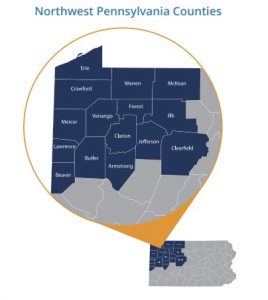Justice Involved Veterans Recidivism and The Impact of Veteran Treatment Courts (VCTs)

The Northwest Pennsylvania (NW PA) Veteran Suicide Prevention Program operates on a three-pronged approach involving healthcare providers, community organizations, and Veterans and their families in the 15 counties of NW PA.
This article summarizes a research presentation by Greg Griffith, Senior Program Implementation Specialist, and explores the following topics:
- The origins of Veteran Treatment Courts (VTCs)
- Benefits and limitations of VTCs
- Recommendations for expanding the positive benefits of VTCs and overcoming some limitations
Read time: 5 minutes
A pdf of the presentation, including sources, is available for download. The presentation is based on the article Waging War on Recidivism Among Justice-Involved Veterans: An Impact Evaluation of a Large Urban Veterans Treatment Court.
What are VTCs?
 The first VTC was created in 2008 in Buffalo, NY by Judge Robert T. Russell and is modeled after the Buffalo Drug Treatment Court which Judge Russell implemented in 1995. What are VTCs?
The first VTC was created in 2008 in Buffalo, NY by Judge Robert T. Russell and is modeled after the Buffalo Drug Treatment Court which Judge Russell implemented in 1995. What are VTCs?
- Non-adversarial solutions-based justice initiatives for Veterans
- Problem solving courts based in part on the drug court model
- Currently, there are 500+ VTCs in 40 states, with 25 in Pennsylvania
- VTC exist in five of the 15 counties covered by NW PA Veteran Suicide Prevention Program
Benefits and Limitations of VTCs
 Many states have passed legislation or administrative orders creating VTCs and they are currently the fastest growing specialty court across the country. The efficacy of VTCs has not been fully researched though their expansion continues. In the research article upon which the presentation is based, the following parameters defined the study:
Many states have passed legislation or administrative orders creating VTCs and they are currently the fastest growing specialty court across the country. The efficacy of VTCs has not been fully researched though their expansion continues. In the research article upon which the presentation is based, the following parameters defined the study:
- The VTCs studied limited participation to Veterans with non-violent misdemeanors
- VTC participants received mental health and substance use disorder treatment, as well as housing, vocational training and transportation services
- A new arrest did not automatically lead to termination from the VTC, and relapse is expected and accounted for
- Continued participation requires adherence to a tailored treatment regimen
Expanding Positive Benefits of VTCs and Overcoming Limitations
 This study indicates that VTCs may be a viable tool in slowing the revolving door of the criminal justice system while getting justice-involved Veterans the treatment and services they need. The VTCs studied reported high outcomes for all participants and a 100% success rate for Black Veteran participants. In addition, the program was also beneficial in reducing re-arrest up to 36 months after program entry. However, these results must be interpreted with specific limitations in mind. Those limitations include:
This study indicates that VTCs may be a viable tool in slowing the revolving door of the criminal justice system while getting justice-involved Veterans the treatment and services they need. The VTCs studied reported high outcomes for all participants and a 100% success rate for Black Veteran participants. In addition, the program was also beneficial in reducing re-arrest up to 36 months after program entry. However, these results must be interpreted with specific limitations in mind. Those limitations include:
- Veterans chose to participate in or opt out of the program which impacted selection bias
- Half of respondent VTCs reported having no database to track and evaluate outcomes
- Recidivism is not uniformly defined across VTCs
Share Our Vision and Get Involved
Our Vision: The work of the Northwest Pennsylvania Veteran Suicide Prevention Program will result in resident Veteran suicides being reduced to zero by the end of the project period (August 31, 2025).
Whether you identify as a healthcare provider, community organization, or Veteran, there are several opportunities through the NW PA Veteran Suicide Prevention Program and PERU to connect to resources, participate in educational training, and promote harm reduction strategies. We are actively recruiting healthcare and community partners to work with us in meeting our goals and objectives. To learn more, visit the program website at theresilientveteran.org.
Need Help? Know Someone Who Does? Contact the National Suicide Prevention Lifeline at 988 or use the online Lifeline Crisis Chat. Both are free and confidential. You’ll be connected to a skilled, trained counselor in your area.

